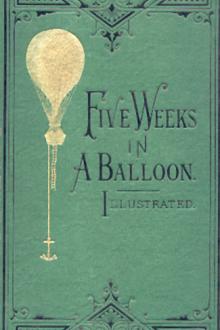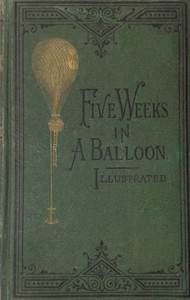Five Weeks in a Balloon, Jules Verne [top reads txt] 📗

- Author: Jules Verne
- Performer: -
Book online «Five Weeks in a Balloon, Jules Verne [top reads txt] 📗». Author Jules Verne
Joe knew nothing about this peculiarity of the region, but he was none the less ready to profit by it. He caught sight of a boat drifting about, without occupants, and was soon aboard of it. He found it to be but the trunk of a tree rudely hollowed out; but there were a couple of paddles in it, and Joe, availing himself of a rapid current, allowed his craft to float along.
“But let us see where we are,” he said. “The polar-star there, that does its work honorably in pointing out the direction due north to everybody else, will, most likely, do me that service.”
He discovered, with satisfaction, that the current was taking him toward the northern shore of the lake, and he allowed himself to glide with it. About two o’clock in the morning he disembarked upon a promontory covered with prickly reeds, that proved very provoking and inconvenient even to a philosopher like him; but a tree grew there expressly to offer him a bed among its branches, and Joe climbed up into it for greater security, and there, without sleeping much, however, awaited the dawn of day.
When morning had come with that suddenness which is peculiar to the equatorial regions, Joe cast a glance at the tree which had sheltered him during the last few hours, and beheld a sight that chilled the marrow in his bones. The branches of the tree were literally covered with snakes and chameleons! The foliage actually was hidden beneath their coils, so that the beholder might have fancied that he saw before him a new kind of tree that bore reptiles for its leaves and fruit. And all this horrible living mass writhed and twisted in the first rays of the morning sun! Joe experienced a keen sensation or terror mingled with disgust, as he looked at it, and he leaped precipitately from the tree amid the hissings of these new and unwelcome bedfellows.
“Now, there’s something that I would never have believed!” said he.
He was not aware that Dr. Vogel’s last letters had made known this singular feature of the shores of Lake Tchad, where reptiles are more numerous than in any other part of the world. But after what he had just seen, Joe determined to be more circumspect for the future; and, taking his bearings by the sun, he set off afoot toward the northeast, avoiding with the utmost care cabins, huts, hovels, and dens of every description, that might serve in any manner as a shelter for human beings.
How often his gaze was turned upward to the sky! He hoped to catch a glimpse, each time, of the Victoria; and, although he looked vainly during all that long, fatiguing day of sore foot-travel, his confident reliance on his master remained undiminished. Great energy of character was needed to enable him thus to sustain the situation with philosophy. Hunger conspired with fatigue to crush him, for a man’s system is not greatly restored and fortified by a diet of roots, the pith of plants, such as the Mele, or the fruit of the doum palm-tree; and yet, according to his own calculations, Joe was enabled to push on about twenty miles to the westward.
His body bore in scores of places the marks of the thorns with which the lake-reeds, the acacias, the mimosas, and other wild shrubbery through which he had to force his way, are thickly studded; and his torn and bleeding feet rendered walking both painful and difficult. But at length he managed to react against all these sufferings; and when evening came again, he resolved to pass the night on the shores of Lake Tchad.
There he had to endure the bites of myriads of insects —gnats, mosquitoes, ants half an inch long, literally covered the ground; and, in less than two hours, Joe had not a rag remaining of the garments that had covered him, the insects having devoured them! It was a terrible night, that did not yield our exhausted traveller an hour of sleep. During all this time the wild-boars and native buffaloes, reenforced by the ajoub—a very dangerous species of lamantine —carried on their ferocious revels in the bushes and under the waters of the lake, filling the night with a hideous concert. Joe dared scarcely breathe. Even his courage and coolness had hard work to bear up against so terrible a situation.
At length, day came again, and Joe sprang to his feet precipitately; but judge of the loathing he felt when he saw what species of creature had shared his couch—a toad!—but a toad five inches in length, a monstrous, repulsive specimen of vermin that sat there staring at him with huge round eyes. Joe felt his stomach revolt at the sight, and, regaining a little strength from the intensity of his repugnance, he rushed at the top of his speed and plunged into the lake. This sudden bath somewhat allayed the pangs of the itching that tortured his whole body; and, chewing a few leaves, he set forth resolutely, again feeling an obstinate resolution in the act, for which he could hardly account even to his own mind. He no longer seemed to have entire control of his own acts, and, nevertheless, he felt within him a strength superior to despair.
However, he began now to suffer terribly from hunger. His stomach, less resigned than he was, rebelled, and he was obliged to fasten a tendril of wild-vine tightly about his waist. Fortunately, he could quench his thirst at any moment, and, in recalling the sufferings he had undergone in the desert, he experienced comparative relief in his exemption from that other distressing want.
“What can have become of the Victoria?” he wondered. “The wind blows from the north, and she should be carried back by it toward the lake. No doubt the doctor has gone to work to right her balance, but yesterday would have given him time enough for that, so that may be to-day—but I must act just as if I was never to see him again. After all, if I only get to one of the large towns on the lake, I’ll find myself no worse off than the travellers my master used to talk about. Why shouldn’t I work my way out of the scrape as well as they did? Some of them got back home again. Come, then! the deuce! Cheer up, my boy!”
Thus talking to himself and walking on rapidly, Joe came right upon a horde of natives in the very depths of the forest, but he halted in time and was not seen by them. The negroes were busy poisoning arrows with the juice of the euphorbium—a piece of work deemed a great affair among these savage tribes, and carried on with a sort of ceremonial solemnity.
Joe, entirely motionless and even holding his breath, was keeping himself concealed in a thicket, when, happening to raise his eyes, he saw through an opening in the foliage the welcome apparition of the balloon—the Victoria herself—moving toward the lake, at a height of only about one hundred feet above him. But he could not make himself heard; he dared not, could not make his friends even see him!
Tears came to his eyes, not of grief but of thankfulness; his master was then seeking him; his master had not left him to perish! He would have to wait for the departure of the blacks; then he could quit his hiding-place and run toward the borders of Lake Tchad!
But by this time the Victoria was disappearing in the distant sky. Joe still determined to wait for her; she would come back again, undoubtedly. She did, indeed, return, but farther to the eastward. Joe ran, gesticulated, shouted—but all in vain! A strong breeze was sweeping the balloon away with a speed that deprived him of all hope.
For the first time, energy and confidence abandoned the heart of the unfortunate man. He saw that he was lost. He thought his master gone beyond all prospect of return. He dared no longer think; he would no longer reflect!
Like a crazy man, his feet bleeding, his body cut and torn, he walked on during all that day and a part of the next night. He even dragged himself along, sometimes on his knees, sometimes with his hands. He saw the moment nigh when all his strength would fail, and nothing would be left to him but to sink upon the ground and die.
Thus working his way along, he at length found himself close to a marsh, or what he knew would soon become a marsh, for night had set in some hours before, and he fell by a sudden misstep into a thick, clinging mire. In spite of all his efforts, in spite of his desperate struggles, he felt himself sinking gradually in the swampy ooze, and in a few minutes he was buried to his waist.
“Here, then, at last, is death!” he thought, in agony, “and what a death!”
He now began to struggle again, like a madman; but his efforts only served to bury him deeper in the tomb that the poor doomed lad was hollowing for himself; not a log of wood or a branch to buoy him up; not a reed to which he might cling! He felt that all was over! His eyes convulsively closed!
“Master! master!—Help!” were his last words; but his voice, despairing, unaided, half stifled already by the rising mire, died away feebly on the night.
CHAPTER THIRTY-SIXTH.
A Throng of People on the Horizon.—A Troop of Arabs.—The Pursuit. —It is He.—Fall from Horseback.—The Strangled Arab.—A Ball from Kennedy.—Adroit Manoeuvres.—Caught up flying.—Joe saved at last.
From the moment when Kennedy resumed his post of observation in the front of the car, he had not ceased to watch the horizon with his utmost attention.
After the lapse of some time he turned toward the doctor and said:
“If I am not greatly mistaken I can see, off yonder in the distance, a throng of men or animals moving. It is impossible to make them out yet, but I observe that they are in violent motion, for they are raising a great cloud of dust.”
“May it not be another contrary breeze?” said the doctor, “another whirlwind coming to drive us back northward again?” and while speaking he stood up to examine the horizon.
“I think not, Samuel; it is a troop of gazelles or of wild oxen.”
“Perhaps so, Dick; but yon throng is some nine or ten miles from us at least, and on my part, even with the glass, I can make nothing of it!”
“At all events I shall not lose sight of it. There is something remarkable about it that excites my curiosity. Sometimes it looks like a body of cavalry manoeuvring. Ah! I was not mistaken. It is, indeed, a squadron of horsemen. Look—look there!”
The doctor eyed the group with great attention, and, after a moment’s pause, remarked:
“I believe that you are right. It is a detachment of Arabs or Tibbous, and they are galloping in the same direction with us, as though in flight, but we are going faster than they, and we are rapidly gaining on them. In half an hour we shall be near enough to see them and know what they are.”
Kennedy had again lifted his glass and was attentively scrutinizing them. Meanwhile the crowd of horsemen was becoming more distinctly visible, and a few were seen to detach themselves from the main body.
“It is some hunting manoeuvre, evidently,” said Kennedy. “Those fellows seem to be in





Comments (0)